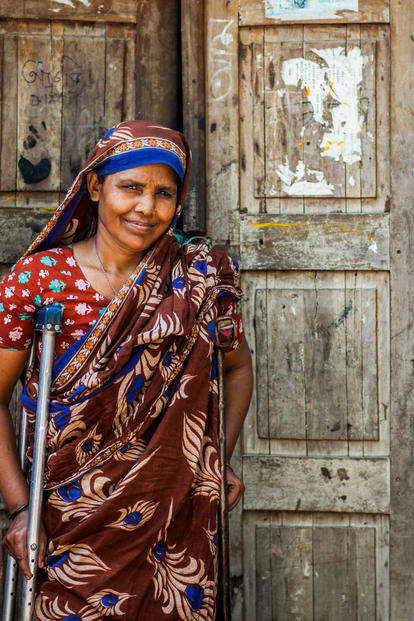
Human Rights
Principle 2
Guidance and Resources
Universal Declaration on Human Rights (1948)
International Covenant on Civil and Political Rights (1966)
International Covenant on Economic, Social and Cultural Rights (1966)
International Convention on the Elimination of All Forms of Racial Discrimination (1969)
Convention on the Elimination of All Forms of Discrimination Against Women (1981)
Convention on the Rights of the Child (1989)
Convention on the Rights of Persons with Disabilities (2006)
UN Declaration on the Rights of Indigenous Peoples
Overview
UNDP recognizes the centrality of human rights to sustainable development, poverty alleviation, sustaining peace and ensuring fair distribution of development opportunities and benefits and is committed to supporting "universal respect for, and observance of, human rights and fundamental freedoms for all."1
UNDP adheres to the United Nations Development Group (UNDG) Statement of Common Understanding of the Human Rights-Based Approach to Development Cooperation and Programming (UN Common Understanding)2 which outlines that development programmes and policies should further the realization of human rights as laid down in the Universal Declaration of Human Rights and other human rights instruments. UNDP’s Strategic Plan 2018-2021 also recognizes the protection of human rights as a core development need central to addressing key development challenges.3
In furthering the realization of rights, UNDP refrains from providing support for activities that may contribute to violations of a State's human rights obligations and the core international human rights treaties,4 and seeks to support the protection and fulfillment of human rights. UNDP programmes and projects are required to be informed by human rights analysis, including from the UN human rights mechanisms (the relevant human rights treaty bodies, the Universal Periodic Review process and Special Procedures).
In its programmes and projects, UNDP upholds the principles of accountability and the rule of law, participation and inclusion, and equality and non-discrimination, noting that prohibited grounds of discrimination include race, ethnicity, sex, age, language, disability, sexual orientation, gender identity, religion, political or other opinion, national or social or geographical origin, property, birth, health status or other status including as an indigenous person or as a member of a minority. UNDP also ensures the meaningful, effective and informed participation of stakeholders in the formulation, implementation, monitoring and evaluation of programmes and projects.
UNDP programmes and projects are inclusive of and accessible to persons with disabilities, with reasonable accommodations5 provided to ensure that persons with disabilities can exercise all human rights and fundamental freedoms on an equal basis with others.
UNDP seeks to support governments to adhere to their human rights obligations and empower individuals and groups, particularly the most marginalized, to realize their rights and to ensure that they fully participate throughout UNDP's programming cycle. UNDP seeks to support State efforts to meet their human rights obligations as requested. UNDP does not have a monitoring role with respect to human rights. In the context of UNDP programmes and projects, UNDP's due diligence obligations require UNDP to monitor compliance with its policies.
| Footnotes: |
|---|
|
(1) Charter of the United Nations, Article 1, para. 3. (2) More information on the UN Common Understanding is available at https://hrbaportal.undg.org/the-un-and-hrba. (3) UNDP Strategic Plan 2018-2021, para. 22ff. (4) These include the following: International Convention on the Elimination of All Forms of Racial Discrimination (1969), International Covenant on Civil and Political Rights (1976), International Covenant on Economic, Social and Cultural Rights (1976), Convention on the Elimination of All Forms of Discrimination against Women (1981), Convention against Torture and Other Cruel, Inhuman or Degrading Treatment or Punishment (1987), Convention on the Rights of the Child (1990), International Convention on the Protection of the Rights of All Migrant Workers and Members of Their Families (2003), International Convention for the Protection of All Persons from Enforced Disappearance (2010), Convention on the Rights of Persons with Disabilities (2008). (5) Article 2 of the Convention on the Rights of Persons with Disabilities defines reasonable accommodations as “[n]ecessary and appropriate modification and adjustments not imposing a disproportionate or undue burden, where needed in a particular case, to ensure to persons with disabilities the enjoyment or exercise on an equal basis with others of all human rights and fundamental freedoms.” |
